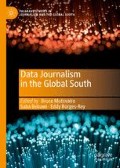Abstract
In authoritarian China, where journalism is under censorship and access to information is limited, doing data-driven journalism means extra challenges. However, China’s data journalists seem to have been dancing with chains. Data journalism is increasingly an effective vehicle for news media to tell stories with complexity, unveil the truth, and uphold social justice. Data journalism is thriving in China, the chief practitioner of which is Caixin Media’s data group, which won the Global Editors Network (GEN) 2018 Data Journalism Awards in the “Best Data Journalism Team (large newsroom)” category last year. Caixin VisLab’s winning of this award marks the first time a China-based media outlet has won a well-recognized competition in the field of data journalism, symbolizing the first-class status of China’s data journalism on the global stage. This chapter presents a case study into the emerging practice of data journalism in communist China. It is based on a content analysis of the data-driven news works produced by Caixin VisLab since its establishment in 2013, as well as a review of documented background information regarding the general development of data journalism in the country. It is also sourced from an in-depth interview with Zhimin Huang, founder of Caixin VisLab, who is commonly called “China’s first person of data journalism.” This chapter identifies and examines actors, data access conditions, practices, and the required tools and skills in Caixin’s data news. It addresses the subject matter from several perspectives pertinent to data journalism in China, including (1) development and status, (2) source and content, (3) the challenges of working data in a tightly monitored media environment, (4) divergence from the Western standard practices, and (5) opportunities and prospect.
Access this chapter
Tax calculation will be finalised at checkout
Purchases are for personal use only
Notes
- 1.
- 2.
- 3.
- 4.
- 5.
“Star Map of Nobel Laureate 1901–2014” https://www.informationisbeautifulawards.com/showcase/541-starmap-of-nobel-prize
- 6.
- 7.
- 8.
- 9.
References
Creswell, J. W., & Poth, C. N. (2018). Qualitative inquiry and research design: Choosing among five traditions (4th ed.). Thousand Oaks: Sage.
He, R. (2018). Report on policies related to data journalism. In J. Wang & H. Su (Eds.), Blue book of data journalism: Report on development of data journalism in China (pp. 85–102). Beijing, China: Social Sciences Academic Press (China).
Kuang, X. (2017). Negotiating the boundaries of news reporting: Journalists’ strategies to access and report political information in China. MedieKultur: Journal of media and communication research, 33(62), 17.
Patton, M. Q. (2015). Qualitative research and evaluation methods: Integrating theory and practice (4th ed.). Thousand Oaks: Sage.
Rogers, S. (2013). Facts are sacred. London: Faber & Faber.
Tang, Y. (2014). “Feeling for rocks while crossing the river”: An analysis of the statutory language of China’s first freedom of information law. Journal of Information Policy, 4, 342–376.
Zhang, S., & Feng, J. (2018). A Step Forward? Exploring the diffusion of data journalism as journalistic innovations in China. Journalism Studies, 20(9), 1281–1300.
Acknowledgments
The author is grateful to Hong Kong Baptist University for supporting the early stage of this research with funding. Her gratitude also goes to Zoe Hu for providing valuable assistance to this study.
Author information
Authors and Affiliations
Corresponding author
Editor information
Editors and Affiliations
Rights and permissions
Copyright information
© 2019 The Author(s)
About this chapter
Cite this chapter
Du, R. (2019). Dancing with Chains: A Case Study of Data Journalism in China. In: Mutsvairo, B., Bebawi, S., Borges-Rey, E. (eds) Data Journalism in the Global South. Palgrave Studies in Journalism and the Global South. Palgrave Macmillan, Cham. https://doi.org/10.1007/978-3-030-25177-2_7
Download citation
DOI: https://doi.org/10.1007/978-3-030-25177-2_7
Published:
Publisher Name: Palgrave Macmillan, Cham
Print ISBN: 978-3-030-25176-5
Online ISBN: 978-3-030-25177-2
eBook Packages: Literature, Cultural and Media StudiesLiterature, Cultural and Media Studies (R0)

